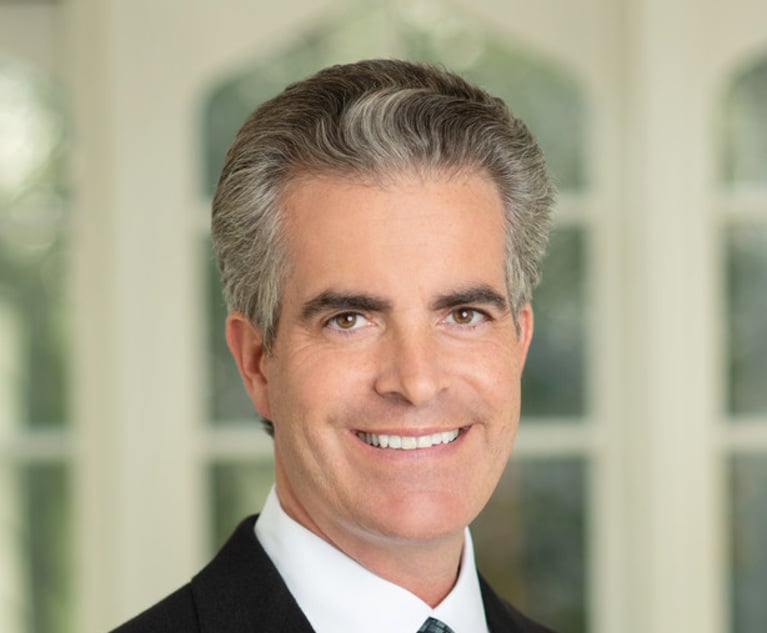How to Effectively Work With Millennials as Employees and Clients
Millennials—generally defined as the generation born between 1981-1997—have defined themselves as a distinct population that has different expectations in the workplace. As millennials currently represent the largest segment of the workforce, at nearly three times the size of the preceding generation, it is incumbent upon seasoned professionals to ensure to acclimate millennials to our workplaces. We are all familiar with the stereotypes of millennials—that their work ethic is lacking, or that an "everybody gets a trophy" mentality has left them unprepared for the workforce. Yet these stereotypes have been consistently debunked by the accomplishments of young people across our profession (see, e.g., Lauren Stiller Rikleen, "How the 'Millennial' Generation Works," The American Bar Association).
June 22, 2017 at 04:28 PM
8 minute read
Millennials—generally defined as the generation born between 1981-1997—have defined themselves as a distinct population that has different expectations in the workplace. As millennials currently represent the largest segment of the workforce, at nearly three times the size of the preceding generation, it is incumbent upon seasoned professionals to ensure to acclimate millennials to our workplaces. We are all familiar with the stereotypes of millennials—that their work ethic is lacking, or that an “everybody gets a trophy” mentality has left them unprepared for the workforce. Yet these stereotypes have been consistently debunked by the accomplishments of young people across our profession (see, e.g., Lauren Stiller Rikleen, “How the 'Millennial' Generation Works,” The American Bar Association).
The decision-makers at many law firms, who tend to be older, white and male (and who may have spent their entire career at just one or two firms), can appear out-of-step with millennial employees and clients and be less responsive to their needs and motivations. How our profession adapts to millennial employees and clients is one of the largest challenges we face in the coming years.
|Working With Millennials as Employees
• Flexibility.
It is no wonder why millennials are drawn to companies like Google with colorful workspaces and casual dress codes. While we cannot expect law firms to imitate Google's office, firms can offer flexibility in their workplace environments as long as productivity and client service remains constant. For example, as millennials do not rely on in-person interactions as much as older generations. They do not believe face time in an office necessarily equate to work product. Billable hours do not necessarily need to take place in the office, nor do client meetings all occur during the typical 9-to-5 schedule. Millennials enjoy being independent and are accustomed to being drawn in a myriad of directions. Hours that are customarily reserved for productivity may not appeal to millennials and flexible work arrangements may be the new norm.
This content has been archived. It is available through our partners, LexisNexis® and Bloomberg Law.
To view this content, please continue to their sites.
Not a Lexis Subscriber?
Subscribe Now
Not a Bloomberg Law Subscriber?
Subscribe Now
NOT FOR REPRINT
© 2024 ALM Global, LLC, All Rights Reserved. Request academic re-use from www.copyright.com. All other uses, submit a request to [email protected]. For more information visit Asset & Logo Licensing.
You Might Like
View All
Pittsburgh Judge Rules Loan Company's Online Arbitration Agreement Unenforceable
3 minute read
Phila. Jury Awards $15M to Woman Who Slipped on Apartment Building Stairs
4 minute read
Pa. Hospital Agrees to $16M Settlement Following High Schooler's Improper Discharge
4 minute read
Plaintiffs Seek Redo of First Trial Over Medical Device Plant's Emissions
4 minute readTrending Stories
Who Got The Work
Michael G. Bongiorno, Andrew Scott Dulberg and Elizabeth E. Driscoll from Wilmer Cutler Pickering Hale and Dorr have stepped in to represent Symbotic Inc., an A.I.-enabled technology platform that focuses on increasing supply chain efficiency, and other defendants in a pending shareholder derivative lawsuit. The case, filed Oct. 2 in Massachusetts District Court by the Brown Law Firm on behalf of Stephen Austen, accuses certain officers and directors of misleading investors in regard to Symbotic's potential for margin growth by failing to disclose that the company was not equipped to timely deploy its systems or manage expenses through project delays. The case, assigned to U.S. District Judge Nathaniel M. Gorton, is 1:24-cv-12522, Austen v. Cohen et al.
Who Got The Work
Edmund Polubinski and Marie Killmond of Davis Polk & Wardwell have entered appearances for data platform software development company MongoDB and other defendants in a pending shareholder derivative lawsuit. The action, filed Oct. 7 in New York Southern District Court by the Brown Law Firm, accuses the company's directors and/or officers of falsely expressing confidence in the company’s restructuring of its sales incentive plan and downplaying the severity of decreases in its upfront commitments. The case is 1:24-cv-07594, Roy v. Ittycheria et al.
Who Got The Work
Amy O. Bruchs and Kurt F. Ellison of Michael Best & Friedrich have entered appearances for Epic Systems Corp. in a pending employment discrimination lawsuit. The suit was filed Sept. 7 in Wisconsin Western District Court by Levine Eisberner LLC and Siri & Glimstad on behalf of a project manager who claims that he was wrongfully terminated after applying for a religious exemption to the defendant's COVID-19 vaccine mandate. The case, assigned to U.S. Magistrate Judge Anita Marie Boor, is 3:24-cv-00630, Secker, Nathan v. Epic Systems Corporation.
Who Got The Work
David X. Sullivan, Thomas J. Finn and Gregory A. Hall from McCarter & English have entered appearances for Sunrun Installation Services in a pending civil rights lawsuit. The complaint was filed Sept. 4 in Connecticut District Court by attorney Robert M. Berke on behalf of former employee George Edward Steins, who was arrested and charged with employing an unregistered home improvement salesperson. The complaint alleges that had Sunrun informed the Connecticut Department of Consumer Protection that the plaintiff's employment had ended in 2017 and that he no longer held Sunrun's home improvement contractor license, he would not have been hit with charges, which were dismissed in May 2024. The case, assigned to U.S. District Judge Jeffrey A. Meyer, is 3:24-cv-01423, Steins v. Sunrun, Inc. et al.
Who Got The Work
Greenberg Traurig shareholder Joshua L. Raskin has entered an appearance for boohoo.com UK Ltd. in a pending patent infringement lawsuit. The suit, filed Sept. 3 in Texas Eastern District Court by Rozier Hardt McDonough on behalf of Alto Dynamics, asserts five patents related to an online shopping platform. The case, assigned to U.S. District Judge Rodney Gilstrap, is 2:24-cv-00719, Alto Dynamics, LLC v. boohoo.com UK Limited.
Featured Firms
Law Offices of Gary Martin Hays & Associates, P.C.
(470) 294-1674
Law Offices of Mark E. Salomone
(857) 444-6468
Smith & Hassler
(713) 739-1250





